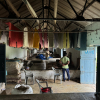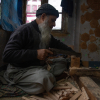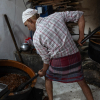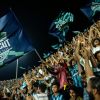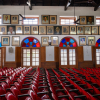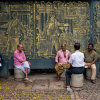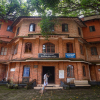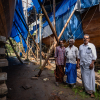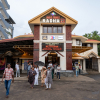Here five young students talk to their interviewers about their reading and writing experiences and their relationship to various texts and writers. This segment is an experiment; an experiment to listen to what children have to say. About reading, about writing, about dreaming and about giving colours and words to their dreams. It is a reminder to us all that there is always a different story to be told, and those stories may reframe our existing discourses about children.[i]
I
Q: What is your name?
A: Panchami.
Q: Interesting name. Any particular reason behind choosing the name?
A: My father’s favourite name.
Q: OK. What is the meaning of your name?
A: Moonlight.
Q: Which class are you studying in?
A: Tenth class.
Q: Where do you live?
A: Kunnarur, Mananthavadi.
Q: This is a project about children’s literature in Kerala. The discussion would be about reading and writing habits of children. So, do you read? What do you read?
A: I read novels, stories and poems.
Q: Which authors’ works have you read so far? How were you introduced to reading?
A: My father used to buy me books from Kerala Sasthra Sahithya Parishad. He used to give me books of Kunjunni Mash as well. That is how I developed an interest in reading.
Q: Do you remember any of the earliest books you read?
A: I used to read short stories first, comics and so on, when I was very young.
Q: Do you have the habit of reading magazines?
A: I read them nowadays. Like Mathrubhumi weekly.
Q: Can you share your reading experience? Which authors have you read?
A: I have read Basheer, a little of M. Mukundan, Khasakinte Ithihasam (The Legends of Khasak) of O.V. Vijayan, Les Misérables, Crime and Punishment, etc.
Q: What about poetry?
A: I mostly read contemporary poets. Pavithran Theekuni, Kalpatta Narayanan, etc.
Q: Who is your favourite author?
A: Basheer.
Q: Why?
A: His language is the greatest reason. He breaks all the rules of grammar. He has a way with language. His writing is very enjoyable.
Q: His language is special. What have you read of his?
A: Pathummede Adu (Pathumma’s Goat), Balyakalasakhi (Childhood Companion), Viswavikhyathamaya Mookku (The World-Renowned Nose), etc. Almost all his works…
Q: Any favourite?
A: I like Pathummede Adu the most as I read it first.
Q: You said he breaks all grammar rules. Is that a reason? Not just of language; but of everything.
A: Mmm…
Q: Which is your favourite poem?
A: I have heard my father, mother and others sing O.N.V. Kurup’s poems. I know him more from my parents’ reciting his poems than from reading him. My parents used to explain the meaning of his poems to me.
Q: How did you progress from there? Tell me about your reading experience.
A: My reading habit is closely connected with the public library at my place. I spend a lot of time there, reading.
Q: Is there anyone guiding you? Or, do you select your own books?
A: I choose books that I like. Then I would ask my parents if it is good.
Q: Are you part of any reading group? Any activities?
A: We had a reading contest. I read about 82 books then. A year-long contest. I used to write reader’s notes then.
Q: How do you view Basheer’s stories when writing such notes? You spoke about the language; besides language…?
A: The rural background, it influences our mind a lot. The characters stay in the mind for a long time.
Q: Which genre do you like to read? Stories, poems, novels…
A: Novels.
Q: What do you write?
A: Poems.
Q: Have you published any?
A: Yes, in some of the magazines published locally.
Q: Could you please recite a couple of poems you published?
A: Yes, I will. I mostly write prose-poems.
Recites her poem titled ‘Kayarinte Paadabhedhangal’ (Changing Lessons of Rope)…. [Transliterated version in Malayalam. Some words are missing due to lack of audio clarity. Line breaks are not necessarily the same as that of the poet’s, as I have transliterated from the audio clip. I apologise for any errors that may have crept in.]
Sahityam
Kayarinu oru jnanapeeda puraskarathinte gandhamundu
Kuttanaattile chavittikuzhacha chalimanninte bhavamundu
Varthamana kaalathil ninnum bhoothakalathilekkum
Thirichum aadikondeyirikkunna
Vailopilli kettiya koonthalinte thalamundu
Samaram
Kalante kayyile kayar kaanathayi
Paraathi nalkiyittum
Karyamillennu kanda kaalan
Secretariat padikkal kuthiyirunnu
Divasangalku shesham
Kaalante kanmunniloode
Kayarumayi
Kaalanmarude samskarika jaatha
Kadannu poyi
Apolum kayaru pirikkunna thozhilalikalude
Nilavilikal kaathadapichu kondeyirunnu
Samskaram
Pashuvum chathu morile puliyum poyi
E pazhanchollu paranjavane
Theruvil thallikonnu
Thallikkonnavarude veetil
Ammamar pashukkalayi
Neetikaranju
Kayarinte oratathu undayirunna pashu
Loka raashtrangaliloode sancharichu
Dhesheeyaganam aadithimirthu
[…?]
Oru Indiakkaran
Muhammad Aqlaq ayi
Junaid ayi
Samadanam
Chumaril kay vechu chirichu kondu nilkkunnathu
Chngathi alla changathi kallan
Changathi kallan adhikari akumbol
Adhikari aaraachar akumbol
Adhikaram kolakkayaru akunnu
Apol kalaapathinu
Karunayude mukham akunnu
Sankharshathinu samadanathinteyum
Satyam
[…?] irangivannu
Satyamevajayathe
Kodathi muttathe marakombil
Oru plastic kayaril thoongi marichu
Satyangal matram vilichu parayunna aksharangal
Kayarinte […?] theerunnu
Kayarukal kaaliyanmarakunna kaliyugathil
Kalkikku vazhithetttunnu
Q: Very good. Do you have any other poems ready? Is it your habit to write your poems in several parts? Is that your style?
A: My father told me to; if you write in small segments and add them on, one over the other, it would be nice.
Q: So, you who love Basheer who is outside all grammar rules, like to write in an orderly fashion…
A: Not that, but that would be easier for the reader. I have another small poem titled ‘Avar’ (They).
Recites it… [Transliterated version in Malayalam]
Charithrathinte [chithalinte] kaanaapurangalilelku
Pinthirinju nadannavar
Kaashaya veshadhaarikalayi punarjanichu
Avar adhikarathinte kayarkurukku kayyileduthu
Satyathe thookkikonnu
Himsayude vadivaalukal enthi
Ahimsaye vettiyarinju
Vargeeyathayude moodupadam aniyichu
Manushyare […?]
Oduvil kayyile chorakkara nettiyil varanju
Godeseyude thokkukal kadameduthu
[matoru rakthathe?] vedivechu konnu
Q: Oh, really good one. There is politics in your poems, although every writing is political. I think you like to engage with contemporary issues and political events.
A: Yes.
Interviewer: Thank you…
_____________________
II
Q: What is your name?
A: Vismaya.
Q: Where do you live?
A: Kanjirathingal, Muthadu.
Q: Which class?
A: Tenth.
Q: Do you read?
A: Yes.
Q: Textbooks? Or anything outside them?
A: Other books.
Q: What kinds of books?
A: I like novels, stories…
Q: Poems?
A: I have read only Ramanan. Other poems that I have read are from textbooks.
Q: How did you happen to get your hands on Ramanan?
A: Once I was given the charge of our library. There was only Ramanan as poetry there.
Q: Do you recall any lines from the poem?
A: Not particularly.
Q: No problem. You read more of novels and stories. How did reading become a habit?
A: We live with our grandparents. They used to tell me stories from a very young age. They used to tell me stories and poems they had read in books. They would also read short storybooks to me. Since I was not patient enough to wait to listen to them, I started reading. I began reading children’s magazines even before I reached the first standard. I remember reading Muttathu Varkey’s Oru Kudayum Kunjupengalum (An Umbrella and Little Sister).
Q: Do you still remember the story?
A: Yes. My teachers encouraged me to read more serious books.
Q: Is there a library at school?
A: Yes. I started reading seriously from my fourth standard onwards. My teachers used to help me with selecting the books.
Q: How did you select your books?
A: I used to read books about animals. I would read the preface and blurb of books. I remember the moral more than the plot of the stories.
Q: What else did you read other than books about animals?
A: I read Muttathu Varkey’s novel. I also read Gandhiji’s autobiography while in the seventh standard. There was a reading contest conducted by the Karassery Bank in our place; and that is how I read that book. I had membership in the library at our place and read books from that library.
Q: Who is your favourite author now?
A: Basheer. I have read many of his books.
Q: Which books of Basheer have you read?
A: Pathummede Adu (Pathumma’s Goat), Aanavarium Ponkurishum (Elephant Scooper and Golden Cross), Intuppuppaykkoranendarnnu (My Granddad had an Elephant) etc.
Q: Which one did you like best?
A: Aanavarium Ponkurishum, Pathummede Adu, etc.
Q: What is your experience of reading Basheer?
A: Just because it is Basheer! If you read it once, you would read it again and again. Everyone understands him easily. And he conveys so many things without stating them. I wanted to meet him personally. But, in an interview with Fabi Basheer, I learned that he was no more, and I was so sad about it. In his books, the date of his death was not given. I thought I would meet him once.
Q: Do you read autobiographies? Stories?
A: I have read O.V. Vijayan’s Kadaltheerathu (At Seashore). Then, Gurusagaram (The Infinity of Grace).
Q: Do you like Vijayan?
A: We have to rack our brain to understand him though. One will have to read him at least four times!
Q: Do you write?
A: Yes, I have two poems with me. Since I have given the others for publication, they are not with me.
Q: So, you publish?
A: In school magazines.
Q: Do you write only poems, or stories and diaries as well?
A: When I read Paulo Coelho’s Alchemist, I felt like writing and wrote down some diary entries. You cannot call them diary or story.
Q: Have you read anything else in English?
A: I read short stories in English. We have not been given stories by famous writers. I read mostly in Malayalam.
Q: Whom else do you read?
A: I have read M.T.’s Naalukettu (The House around the Courtyard). Thakazhi’s Kayar (Rope) and Chemmeen (Prawns) and some other works.
Q: You have read most of the prominent writers. How does your reading experience differ with each writer?
A: I have felt that they have differing styles. Most of the earlier writers shone as social reformers. When I choose writers, I become conscious of what kind of writers they are.
Q: You said you write poems. Can you read your poems?
A: My poems are not very musical. I write them in my own way.
Recites her poem ‘Enthe Ingane’ (Why, like this?)… (Transliterated version in Malayalam)
Chalanangalil angane allelnkilum
Njan antharmukhayayirikkunnu [2]
VIshadangalil allenkilum
Njan vishadarogiyanu [2]
Suhruthukkal undenkilum
Njan mounanuragiyanu [2]
Jeevikkunnundenkilum
Njan enne marichu kazhinju [2]
Q: Very good. We expect more of such serious writing. Why did you stop writing?
A: I have a sense of why I wrote something in a particular way only when I write it and not later. I do not know why I wrote it so. I do not even recognize that it is my writing.
Q: Why do you write? Why did you write this particular poem? Does you reading inspire you to write? Or is it some personal experience?
A: I think all of it contributes.
I had asthma. I had some other tensions as well. I was studying in the fourth standard then. My teacher started observing me and gave me books to read. She said that if I read books and wrote, I would forget all my sorrows. I did not believe her initially. However, later I realized that what she said was right. There was a book on Hanuman and it helped me overcome my fears. Then I started writing.
Q: You should read and write more. Who all are there at home?
A: I have a younger brother and a sister, father and mother, and grandfather and grandmother.
Q: Do they all read?
A: They all read.
My grandmother used to write poems. She is a great inspiration to all of us. She used to sing songs and poems. She had printed a book by herself called Kuppayile Manikyam (Precious Stone amidst Garbage) and given it to our school library on my birthday while I was in the seventh standard.
Q: What kind of book was that?
A: Poems. Short poems for children.
Q: Do you have a copy at home?
A: No, I have some of her other poems.
Q: Can you recite one?
A: Recites a poem titled ‘Shalabham’ (Butterfly)… [Transliterated version in Malayalam].
Orkkunnu njan
Orkkunnu njan
Poypoya entoren bhalyakalam
Kallum mulpadarpumulla vazhikaliloode
Ne enne chuttichu
Mazhavil varnamulla
Puthan udupitta ninte pinnale
Onnu thoduvan thottu thaloduvan
Mohicha enne ne pedichittano
Ninne novikkumennulla pedi kondano
Enthinayirunnu kunju shalabhame
Ne odi olichathu enthinayirunnu?
Interviewer: Very good. Convey my regards to her (grandmother). Okay Vismaya, thank you. Read more and write more.
_____________________
III
Q: What is your name?
A: Anshita.
Q: Which class?
A: Tenth.
Q: This is a project about children’s literature in Kerala. Our conversation is part of an interaction with children below 15 years—whom we generally consider under the category of children—who read and write, in order to understand your perspective on the same. So, what is Anshita’s reading experience?
A: I read everything that I come across. There is no selective reading. Mostly, I read in relation with my studies. We may have to know more on subjects related to the lessons in the textbooks. We go to the library, take out books on related areas and thus develop the habit of reading.
Q: So, do you read only those books related to your school syllabus?
A: No, I will not say that. I do read outside the syllabus as well. I went to the library; I saw Basheer’s novel there; I was attracted by its title; so I took it out and felt like reading it.
Q: Which is the latest work that you read?
A: Ramanan (by Changampuzha Krishna Pillai). Now I have borrowed two books. One is Basheer’s Jeevitha Nizhalpadukal (The Shadows of Life) and another book by Oscar Wilde.
Q: When did you start reading?
A: Frankly speaking, I never touched books till the seventh standard. I was not interested in reading. In the eighth standard we had a teacher called Ashraf who taught us Malayalam. He used to talk about reading and the books that he had read. He influenced me to start reading.
Q: What kind of books did you read in the beginning? Did you start with Basheer?
A: No, no. Sir suggested a lot of love stories which we found attractive at that age! Thus, I went to the library and asked for Nalini (by Kumaran Asan). I have mostly read such works.
Q: Have you read children’s magazines?
A: Not much. I do not read them now. I used to read Balarama, Balabhumi, etc. when I was younger.
Q: Did your family encourage such reading and buy books for you?
A: Yes. Father used to buy them. Also, my brother buys books.
Q: Thereafter, you gradually shifted to other literature?
A: Yes.
Q: What did you read the most? What authors have you read?
A: I have read many writers. Among poets, I like Vailoppilli the most. And I am always inclined towards Basheer’s writing. He writes in a style of his own. In Intuppuppaykkoranendarnnu (My Granddad had an Elephant), when Basheer was asked to change the name, he carried it on his shoulders and left without replying. That shows his love for his language. That attracted me a lot.
Q: Since you live in Malappuram district there might be differences in your language and the language used in these literature. Does that create any difficulty for you in your reading?
A: I have not felt that yet. I am a Malayalam student. I did not opt for Arabic. So, I am learning only Malayalam language and literature. I can always consult teachers when I come across unknown words, etc.
Q: Okay. Then, since you read Malayalam literature, have you felt any difference between your own language and that of others?
A: I have not felt like that, either.
Q: Do you write along with reading?
A: I have always desired to…I even ventured once to write a poem. But my friends teased me and, thus, I lost interest. I just wrote two lines. Immediately, they dissuaded me and I stopped writing!
Q: So you mostly read Malayalam?
A: Yes.
Q: And English books, like the one you said about by Oscar Wilde, are read in translation?
A: Yes. I do not read much in English.
Q: Have you read works in Malayalam written exclusively for children, like ‘Aesop’s Stories’ or animal stories like Jungle Book?
A: Yes. I also read graphic books and cartoons.
Interviewer: I am sure you will continue reading. Meanwhile, you should also try your hand at writing. Thank you.
_____________________
IV
Q: What is your name?
A: Eva Maria.
Q: Where do you live?
A: Kathiroor.
Q: Which school?
A: Sacred Heart, Thevara.
Q: And, which class?
A: Tenth.
Q: Eva, do you read?
A: Yes, I do.
Q: Only textbooks, or more?
A: I also read novels.
Q: What kind of books do you read?
A: Short stories and novels. I do not read poems much.
Q: How did reading become your habit/hobby? How did you start reading? Did someone use to tell stories to you when you were young?
A: My father is a voracious reader. He used to tell stories and get books for me from my childhood. I grew up reading such children’s books.
Q: So you used to read from childhood?
A: Yes. Father had a library at home. So I used to take books from there and read.
Q: Have you read children’s magazines or you started reading novels from the beginning?
A: Novels.
Q: Okay. You were not introduced to a children’s magazine reading culture.
A: No.
Q: What is the memory of your first reading experience?
A: First, I used to read short children’s books like ‘Mulla Nazrudeen Stories’, ‘Arabian Tales’, ‘Epic Stories’ etc. Around the third standard I read books like Black Beauty, Muttathu Varkey’s Oru Kudayum Kunjupengalum (An Umbrella and Little Sister), Kunjikoonan (Little Hunchback) etc.
Q: How was the progression of your reading? What did you read thereafter?
A: Around the fifth standard, I started reading seriously. I read novels like that of Basheer. Basheer is my favourite writer. I have read Balyakalasakhi (Childhood Companion), Pathummede Adu (Pathumma’s Goat), Aanavarium Ponkurishum (Elephant Scooper and Golden Cross), Pavapettavarude Veshya (The Prostitute of the Poor), Viswavikhyathamaya Mookku (The World-renowned Nose) and many of his short stories.
Q: Who introduced you to Basheer?
A: It was part of the textbooks from the fifth standard onwards. So I used to take his other books as well from the library to read.
Q: Why do you like Basheer? What is so attractive about his writing?
A: Basheer is a frank writer. He is vociferous in his writing. I have found many other writers writing for the sake of writing. Basheer writes about experiences and ‘real’ and closer-to-life stories.
Q: What about Basheer’s language?
A: Yes, his language especially, descriptions are beautiful. It has influenced my own writing style.
Q: Who else have you read?
A: Rajan Kakkanadan’s Himavante Mukalthattil (On the Top of Himalayas), Arthur Conan Doyle’s Sherlock Holmes, Nehru’s Orachan Makalkkayayacha Kathukal (Letters from Father to Daughter), Ramayanam etc.
Q: Do you read poems?
A: I have not gone there yet!
Q: Which is your favourite work? A work that you always feel like revisiting…
A: For me, that is Himavante Mukalthattil.
Q: Why?
A: Because it narrates experiences of travelling to Himalayas. I used to travel from my childhood. My father has taken me to Ooty, Kodaikanal, etc. I love travelling and also the cold weather. I have read that book many times. It reminds me of my own journeys, I can visualize the Himalayas and its chilly weather while reading it.
Q: Have you read other travel narratives?
A: I read all travel narratives that appear in magazines.
Q: Do you write?
A: Yes, I do.
Q: What do you write?
A: Write-ups on the books that I read. In 2015, there was a letter writing competition held by the Postal Department titled ‘Write a Letter to the Chief Minister’. My letter was one among the ten best letters chosen in the Kerala State level.
Q: Very good. What was that letter about?
A: It was against plastic-usage, invoking the inauguration of a green Kerala. I wrote about the amount of plastic that we dump into nature on a daily-basis ranging from toffee covers to milk covers.
Q: What else do you write? You said travel narratives, right? Do you write stories, poetry etc.?
A: I used to write stories when I was younger. Now, I do not write much.
Q: As reading grows, writing stuns?!
A: Yes!
Q: Okay. Is there any write-up that you want to share?
A: I will read a portion of my letter to Gandhiji.
Q: Sure.
A: ‘Dear Bapuji, at the onset, I salute you who bravely declared to the world that my life is my motto. Many people give advice and directions to others. However, there has been none, but you, who has walked the talk, analysed its pros and cons, and tested its potential. You transformed your life into an ever-glowing star in the alchemy of your experiments with the truth. The message in each of your words is etched in golden scripts in the hearts of not only those in India but also in the entire world’. This is the first paragraph of that letter.
Q: You have a very sharp language. How do you develop your language?
A: Definitely, through reading. Also, when I write, father edits it and introduces new words to me.
Q: Is there a library at school?
A: Yes.
Q: Are there public libraries or other reading spaces nearby?
A: Yes, I am a member of the public library near my house. Also, there is a large library at home.
Q: So, you have access to libraries everywhere—at school, at home and at the village. How does the public library function there? Are there many children who access it? Is there a reading group?
A: There is a children’s reading group. There is also a section exclusively for children in our library. Many children come there and read them.
Interviewer: Okay, thank you Eva.
_____________________
V
Q: What is your name?
A: Ameen Nanma Thomas.
Q: What’s the story behind your name?
A: My parents didn’t have children. So they prayed to god and got my sister and they named her Kripa (blessing). Then they got me and named me Nanma (goodness). [Amin] is the short form of my grandmother’s name—Ammini, and Thomas is my father.
Q: Where’s your place?
A: Kadavanthra, Kumaran Ashan Nagar.
Q: 8th Standard right?
A: Yes.
Q: Do you read books?
A: Yes, I read only English, I do not know Malayalam that well.
Q: Oh so you speak English better than Malayalam?
A: Yes. (Language of the interview shifts from Malayalam to English thereafter).
Q: What kind of books do you read?
A: I love story books like fairy tales. I am a fan of ‘girly’ stuff. And I like novels, [though] not so much. I like adventurous stories like Tom Sawyer. And then I like Geronimo Stilton. I love that. I have read many of those books. Mostly I read in English. I don’t read in Malayalam.
Q: Why, you can’t read Malayalam?
A: No, I am just learning Malayalam.
Q: You speak Malayalam well right?
A: It is okay. From 6th standard I started learning Malayalam.
Q: Okay. Is there anybody else in the family who reads?
A: My sister. She is the one who encouraged me.
Q: Oh your sister initiated you to reading. She gave you books….
A: Yes, she is the one who did everything. Like, she is the first teacher in my life. She is the one who taught me to draw. That’s how I started drawing. I paint too. She taught me how to read and she always makes me sit near her and reads stories to me. That’s how I was very very interested in reading.
Q: Is there anybody else in the family, like your father, mother who reads?
A: Yes, my mother used to read. My father is born in Singapore.
Q: But you are a Malayali?
A: Yes, he is a Malayali. He came here because his father died. He started to learn but he can talk better in English.
Q: Alright. So why do you read? What is the purpose? What do you get when you read?
A: The first thing is the moral they give. The moral and then some entertainment. I don’t like scary stories. I like entertaining and adventurous stories. I just want to read till the story finishes. I love to read.
Q: What about your textbooks? Do you like reading them?
A: Yes, I like them. I read my entire English textbook the very day I got it.
Q: Oh you read them before they are introduced in the class.
A: Yes, I like that.
Q: Where do you buy books?
A: In Crossword. Sometimes I buy. But most of the books I got are from prizes. For prizes they give me many books. Most of them are Malayalam. But my dad’s dad, before he died, bought a bunch of books in Singapore—English books.
Q: You have a huge library at home?
A: Not huge, a little. (This much big) a shelf! It is all arranged as dictionaries and sciences like that. I read like that. And some I borrow from my friends, like Geronimo Stilton.
Q: Alright. So do you write?
A: Yes, only English. But reading is better than writing.
Q: What kind of things do you write?
A: I write my diary, my personal diary.
Q: Do you write poems?
A: Yes, I write poems. Yesterday I wrote one poem. But it is for younger students.
Q: Can you recite it if you remember?
A: It is about strawberries. That’s my favourite fruit. It’s like in rhyming words.
These strawberries are very pinky, squash just like the blush in our cheeks.
And I love this line:
The pink berry which will really sink in my mouth
Full of water
Waiting in a silent hunger
Waiting just for violent lunge.
Q: That’s beautiful. So you paint also right? What kind of things do you paint?
A: Mostly, I like the sunset, that colour.
Q: Do you generally copy from another painting by looking at it, or do you paint just like that on your own?
A: Yes, without looking anywhere. I mostly paint sunsets. And now I wish to paint my grandfather who recently died.
Q: What kind of materials do you use?
A: I use canvas and acrylic paint. Then I use water colour.
Q: Does your reading influence your writing or painting?
A: Yes. Once I read a book by Gandhi ji. I don’t remember its name.
Q: My experiment…
A: Not that, another one. He said that never give up your dreams, and just continue on your dreams, never stop at it. And I dream to become a poet, a singer, a painter….
Q: Oh, do you sing?
A: Yes a little, but only English. I don’t know if everyone likes it.
Q: But you enjoy singing.
A: Yes. And my dream is that I want to become an I.F.S. (Indian Foreign Service) officer.
Q: That’s your dream….
A: Yes and [build?] the biggest […] mall in America. Those are my dreams!
Q: Very good. Do you love any singers or writers or actors in particular?
A: I love singers. Mostly English singers. And also Chinese singers. In Chinese singers, a boy name Third, I love his songs. He is in a group called ‘Chemicals’.
Q: Chinese singer, right?
A: Chinese or Japanese, their language is like that! Like romantic songs he sings. And then I like Justin Bieber songs, then Taylor Swift and my favourite singer is Camila Cabel[l]o.
Q: Alright. And do you have any book in particular that has influenced you?
A: Not like that. My dad always recommends good books, books that have a moral lesson, and I take them.
Interviewer: Alright. Thank you so much.
[i] Interviewers: Shijo Varghese, Abdul Jaleel M. and Bivitha Easo
Shijo Varghese is Assistant Professor, Department of English at Sacred Heart College, Thevara. His MPhil dissertation was on ‘Discursive Violence’ at Department of English at Sree Sankaracharya Sanskrit University, Kalady. He has published poems and short stories in various journals.
Abdul Jaleel M is Assistant Professor in the Department of English, EMEA College of Arts and Science, Malappuram. He is pursuing his doctoral degree in Comparative Literature at University of Hyderabad on ‘Politics, History and Oceanography: A Study of Mappilas of Malabar.’ His areas of interest include Indian Ocean studies, Mappila community, Dalit literature, literary and cultural theory, Malayalam literature.
Bivitha Easo is a doctoral candidate at the Centre for Comparative Literature, University of Hyderabad. Her MPhil dissertation was on ‘Childhood under Construction: Children’s Literature and Curricula in Contemporary Kerala’. Her areas of interest include minority discourse, Christianit(ies), cultures and communities, childhood studies and children’s texts, and regional modernities.




